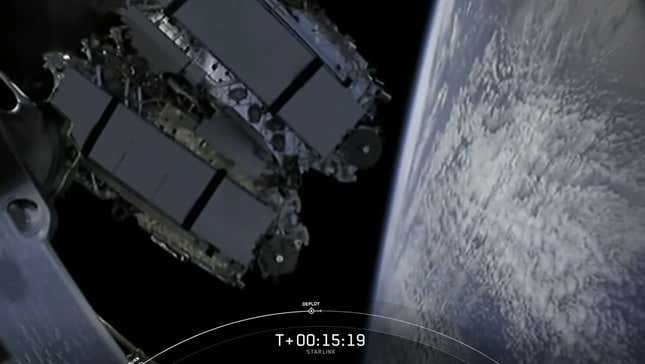
When Elon Musk and SpaceX proposed building an ISP comprised of satellites in low earth orbit, it seemed like a project straight out of sci-fi. And while SpaceX has launched less than 800 of its eventual 12,000 satellite goal, the company just announced that its space-based internet service Starlink is already capable of delivering download speeds upward of 100 Mbps.
While 100Mbps might not sound that impressive compared to ground-based cable and fiber-optic services that can easily hit 1000Mbps or more, Starlink’s new data speeds are just shy of the U.S.’s average broadband speeds, which as of April 2019 clocked in a 118.6 Mbps. Starlink’s 100 Mbps figure is also far higher than the U.S.’s median mobile download speeds of just 29 Mbps, and its far higher than the typical speeds provided by Hughesnet, the current largest provider of satellite-based internet in the U.S. Hughesnet advertises speeds of just 25Mbps, though some lucky customers get better performance.
Hitting the 100 Mbps milestone is important because that’s enough bandwidth for most households today, with SpaceX saying Starlink is “fast enough to stream multiple HD movies at once and still have bandwidth to spare.” Furthermore, that 100Mbps figure would present a significant jump up from a list of speed tests collected and posted on Reddit, which generally showed download speeds ranging from 30 to 65 Mbps.
However, while download speeds of more than 100Mbps might have some people thinking about switching internet providers to Starlink whenever it becomes available (there’s still no official launch date), it’s important to remember that Starlink was never designed to be a real competitor to terrestrial ISPs, but more of a better alternative to DSL or single-point satellite-based internet for people living in rural areas.
As Musk explained in a Starlink presentation earlier this year, “The challenge for anything that is space-based is that the size of the cell is gigantic, it’s not good for high-density situations. [Starlink] will have some small number of customers in LA. But we can’t do a lot of customers in LA because the bandwidth per cell is simply not high enough.”
Earlier this year the FCC even made it possible for satellite-based ISPs, like Starlink, to compete for the $20 billion meant to subsidize rural internet. So there’s a potential for a fast influx of cash if SpaceX can get the system into consumer’s hands.
Musk claims one of Starlink’s major advantages over traditional satellite internet is much better latency, with Musk claiming Starlink’s service will be fast enough play online video games, and with many of the speed tests in the Reddit thread posting latencies between 20 and 30ms, that certainly seems plausible.
So at least for now, Starlink’s download speeds seem quite promising, though it’ll be years before SpaceX can hit it’s 12,000 satellite target. And in the meantime, SpaceX will have to work on some of Starlink’s other hurdles such as complaints from astronomers who claim the number of Starlink satellites could interfere is scientific observations, which Space X has begun addressing by adding black shrouding on new satellites.